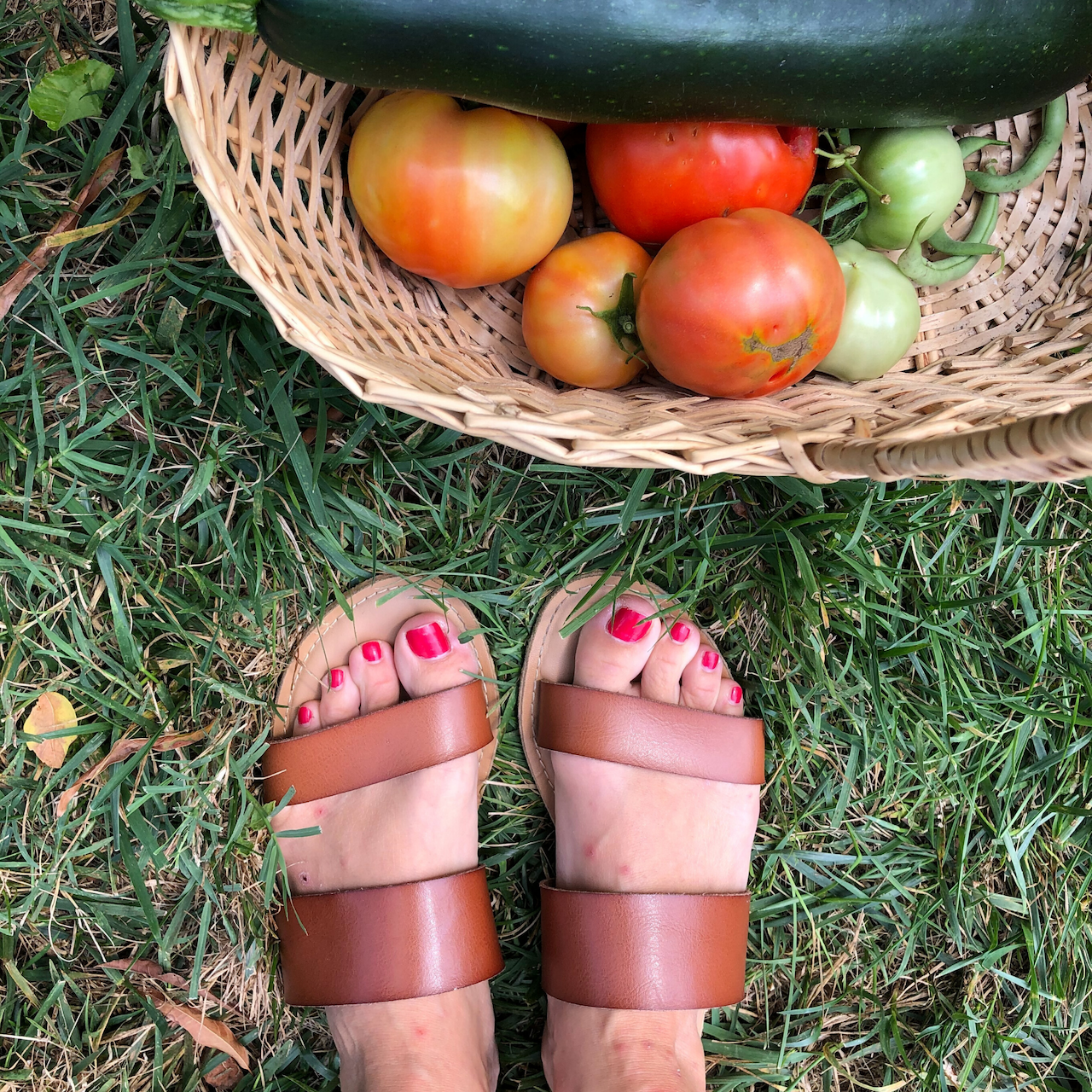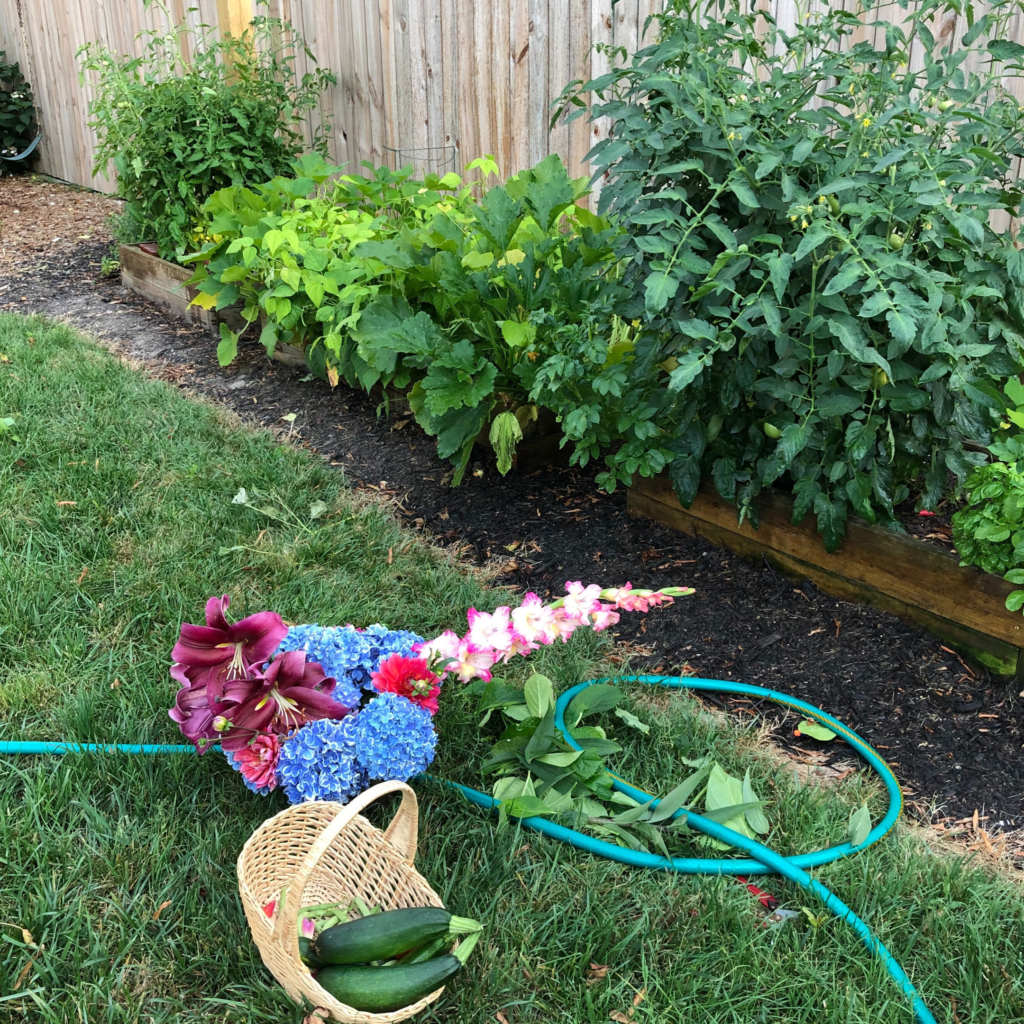
On Spiritual Growth & Cravings
Five years ago, we planted a garden in the back corner of our yard; it barely survived. Our tomato plants were the skimpiest, sorriest ones I had ever seen. Cucumbers rotted before they were fully ripe, and the beans, well they didn’t stand a chance against my neglect. Tucked away behind the garage, the raised beds were somewhat “out of sight out of mind.” It remained this way for four more summers. Same spot, same neglect, same pitiful crop.
So, last fall, when we were prepping the backyard for a shed, we decided to move our raised beds to the other side of the yard. We nestled them against the fence, in a mulched bed with flowers, a few grapevines, and some shrubs. They looked beautiful and fit there perfectly, but I was skeptical. Would a thirty yard transplant make a difference? After the last frost of this year, we planted our seeds and waited to see what would happen.
Slowly, toothpick sized shoots pushed up through the soil. Day after day, I watched our plants grow. They became stronger and healthier, until eventually we started seeing tiny blossoms and flowers, then beans and zucchini. As it turns out, the patch of ground on the other side of the yard gets more sunlight. One little move set these boxed gardens up for better production.
God is making our garden grow.

But there’s also work required from me. As a gardener—and I call myself this in the loosest sense of the word—it’s my responsibility to tend to the patch. Look for weeds and pull them up. Water the plants if we’ve gone too many days without rain. Prop up the tomato plants when the wind knocks them over in a storm. Check for bugs and pick the beans before they shrivel up.
When my garden was behind the garage, it didn’t get enough sunlight, but I also didn’t give it the attention it needed. Rather than flourishing, it withered beneath the heat of a Virginia summer. My neglect stunted its growth.
The same is true for us spiritually. We’re hopeful for change and fruit and spiritual flourishing, but we’re withering away because we aren’t participating in the work God wants to do in our souls.
We want a consistent prayer life, but we never talk to God. We’d like to break free from sinful patterns, but we’re ill-equipped to fight the temptations Satan throws our way. We long for wisdom to know how to navigate the issues of life, but we aren’t reading God’s word and getting to know the source of wisdom.
I believe God makes things grow. Period. But through some mysterious work of the Holy Spirit, as we live by faith and obedience, we take part in it too. This is one of the paradoxes of the Christian life: we work out our salvation with fear and trembling, but it’s God doing the work in us (Philippians 2:12-13).
Spiritual growth comes as we joyfully participate with the Spirit’s work in our lives.
Practically, this will look many different ways, but as I’ve been watching my garden flourish this year, and slicing tomatoes for my cheese and tomato sandwiches, I’ve seen how our spiritual growth is tightly connected with something pretty basic:
“Like newborn infants, long for the pure spiritual milk, that by it you may grow up into salvation—if indeed you have tasted that the Lord is good” (1 Peter 2:2-3).
Spiritual growth begins with our cravings.
Newborn babies instinctively know they need milk. They root around for the source of their food, latch on, and suck as hard as they can. Not just once or twice a day. Newborn babies are constantly looking for the next feeding, making their desire for food known through screams, arched backs, and flailing appendages. Day and night, at the grocery store, when you’re trying to make dinner or finally stepping into the shower—a healthy baby will ask for milk without prompting.
Do they understand why they need it? No. But God has wired little ones with an innate desire for milk so they can develop into larger, well-nourished human beings.
God’s people need spiritual food in order to grow. Not just once or twice. Our need—and subsequent desire—for spiritual food is to be persistent, ongoing, and filled with a sense of urgency. In a sort of flailing of the soul, we are called to bend and stretch and cry out for pure spiritual milk. We are to put ourselves in a place where we have access to the spiritual food we need. We crave it and then we consume it. The Holy Spirit produces this desire in us; God always initiates change in his people. But this verse from 1 Peter is directive. The Greek word translated ‘long’, in the ESV, means to desire, long for, to intensely crave. Peter is saying, if you want to grow up in your faith, you must crave what is necessary in order for you to grow.
What does this have to do with my garden?
Last summer, the garden was barely holding up. This summer, we’ve been picking zucchini for weeks, the beans continue to come in—enough for dinner once or twice a week—and my two tomato plants should last me all summer, and then some. All because we moved our garden to a better patch of sunlight, to a spot where we can easily give it the attention it deserves.
This summer, my garden is set up for success.
When it comes to our spiritual growth, perhaps we need to set ourselves up for some growth. Maybe it means establishing some new rhythms in our day, like reading our Bible, writing down a few prayer requests and praying for the people in our lives. Perhaps it requires rooting out rhythms in our lives that hinder our spiritual growth.
The steps might be simple. But when we set ourselves up for better reception to the things necessary in order for us to grow, God will produce something in us far greater than we ever imagined. As we align our cravings with the food necessary for us to grow, we’ll taste the fruit God brings forth in our lives. Our desire to participate with him in the work of our souls will grow all the more.

My craving for cheese and tomato sandwiches keeps me returning every morning to tighten the tomato stakes, and every evening to water the dried up soil. The kids eagerly join me in picking beans and snapping them for dinner. With each basket full of produce our craving grows and our desire to keep at the work increases. Similarly, when we see the Holy Spirit changing our hearts and bearing fruit in our lives, our craving for more of him increases. Like newborn infants who can’t get enough of their mother’s milk, when we experience the riches that are ours in Christ, and see the growth that he brings about, we will keep coming back for more.
We’ll root around until our souls are latched onto Jesus, fully satisfied with all that is ours in Christ.


One Comment
Marla Allston
Great post, Lauren! Thank you!